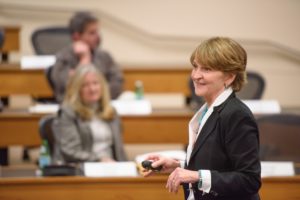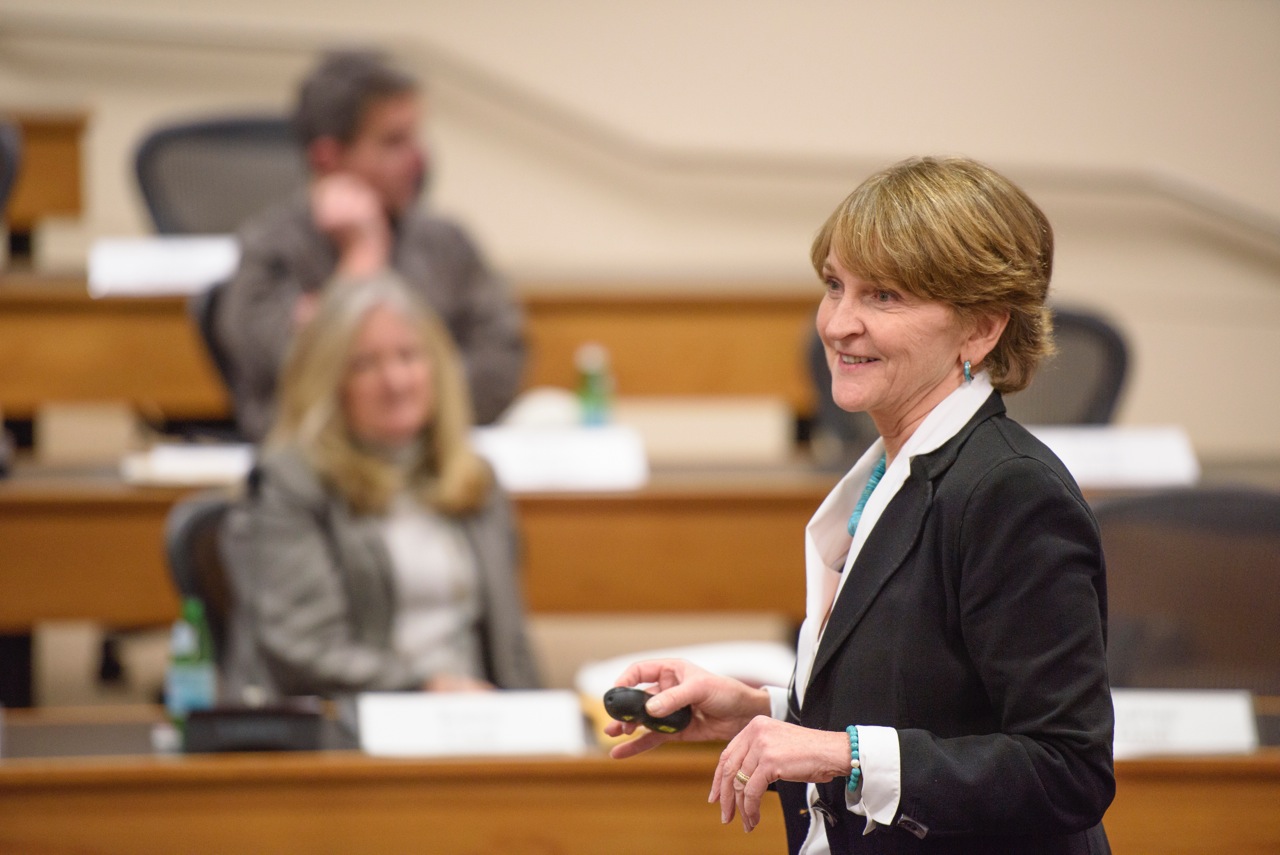In its Thursday meeting, the Faculty Senate discussed updates to Stanford’s Title IX process as well as necessary improvements to the School of Earth, Energy and Environmental Sciences.
Title IX updates

Title IX Coordinator Cathy Glaze ’80 J.D. ’85 described a process implemented over the last year for resolving campus sexual assault cases. According to Glaze, the pilot program is Stanford’s third Title IX system since 2000.
Glaze said the new process differs from previous ones in that it consolidates all necessary actions for a case in one process. In addition, the system allows students to go through a non-hearing process upon recommendation of a Title IX coordinator where both the plaintiff and accused agree on charges as well as punishment. Glaze said the non-hearing option is used when evidence is clear and when parties can come to an agreement on the verdict.
When cases proceed to a hearing, both the plaintiff and the accused represent themselves and a three-judge panel determines responsibility and, if applicable, punishment. Findings of responsibility as well as a vote for expulsion must be unanimous. Less severe punishments only require a simple majority.
Pamela Karlan, Kenneth and Harle Montgomery Professor of Public Law and chair of Stanford’s Advisory Committee on Sexual Assault Policies and Practices, mentioned controversy over the unanimity requirement and fear over what may happen if jurists do not agree.
Glaze also noted that the new process introduced new features to help involved students, such as the Confidential Support Team, which allows students to obtain help without having to report to the Title IX office. Students can also speak to an external evidentiary specialist, a non-Stanford affiliated attorney who can provide an independent assessment of the evidence in a case. Additionally, students can seek counseling from attorney advisors whom Stanford pays for up to nine hours per student. Attorney advisors do not represent students during hearings.
Karlan also discussed the controversial case of recently dismissed Title IX attorney Crystal Riggins. Riggins, formerly one of six lawyers on retainer as student advisors, was dropped following critical comments she made to The New York Times about Stanford’s Title IX process — comments University administration said warranted termination for expressing a “lack of faith” in Stanford’s system.
Karlan said that Provost Persis Drell found no sign of retaliation in the decision to drop Riggins after personally looking at the associated files. However, Drell asked the Advisory Committee on Sexual Assault Policies and Practices to examine the overall attorney process — specifically, whether Stanford should provide students with attorneys and how to consolidate feedback on attorneys. Other members of the Faculty Senate agreed with the need to clear up guidelines for retaining attorneys to prevent potential misunderstandings.
Additionally, Karlan noted that the advisory committee will consider broadening Stanford’s definition of sexual assault, adding that expanded definitions would require further evaluations of the default punishment, expulsion.
“As you expand the definition of the most serious charge in your repertoire of sanctions, the question of how the sanctions should follow the charge becomes a little bit trickier,” Karlan said.
Glaze said there is no “gold standard” for the Title IX process across schools, but that there are definite areas for improvement, such as the timeliness of hearings.
School of Earth, Energy and Environmental Science concerns
Pamela Matson, dean of the School of Earth Sciences, gave a brief presentation about the importance of the issues studied by the School of Earth, Energy and Environmental Sciences. Matson said the school has expanded studies from subsurface systems such as in geology to include surface and socioeconomic systems. The dean also discussed demographics of students.
“We’ve diversified in terms of gender … [but] we need to continue to work on [getting under-represented minorities],” Matson said.
Matson explained that the school faces challenges with growing class size; the Mitchell Building is particularly antiquated in research tools and teaching space, she said. At the same time, Matson expressed concern with the school’s small number of majors, citing a total of 130 students.
Matson said research funding has been flat and the current presidential administration’s attitude toward earth sciences is also concerning. As an example, Matson cited a recent memo she received stating that the federal government may move to close the geosciences part of the National Aeronautics and Space Administration (NASA).
Finally, the Faculty Senate approved the Residential Programs Faculty Board, a permanent committee to oversee residential programs at Stanford. Although the group is currently aimed at undergraduates, there are plans to include graduate residential issues in the future.
Contact Christina Pan at ‘capan’ at stanford.edu
